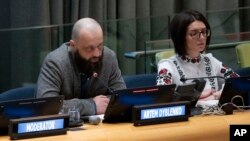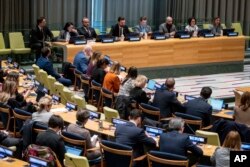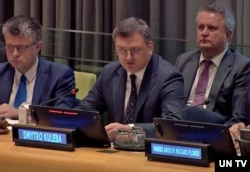Ukrainian marine Artem Dyblenko spent more than four months as a Russian prisoner of war. On Wednesday, he appealed to the international community to help bring home the thousands of soldiers and non-combatants who remain in captivity and seek justice for all who have suffered human rights violations at the hands of Russia since its invasion of Ukraine nearly one year ago.
"I was 125 days in Russian captivity; this is about 3,000 hours," Dyblenko, who was twice decorated for bravery, told a special meeting organized by Ukraine at the United Nations to discuss gross human rights violations caused by Russia’s war.
"Three thousand hours of physical, moral, and psychological abuse," he said. "Three thousand hours of Russian hell."
Illia Samoilenko was the deputy commander of the National Guards of Azov. In the place of the young, bearded officer’s left hand is a metal prosthetic. He said his men fought for 86 days defending Mariupol. He was also captured, and said he is often asked what Russian captivity was like.
"Have you ever seen the movies about Gulag? Just imagine that, but worse," Samoilenko said.
Dyblenko, the marine, who also served in the besieged southern city of Mariupol and later the ill-fated Azovstal steel plant, displayed a photo of his emaciated body when he was released a few months ago. He said no words could convey the horrors that happened to the prisoners of war.
"Today, I am looking for justice in this building," Dyblenko said.
His appeal followed a video message to the meeting from Ukrainian first lady Olena Zelenska, who asked for justice.
"Justice for Ukraine is justice for the entire world," she said. "That’s why we call on the United Nations to establish a special tribunal for the crimes of Russian aggression. It’s not only us who need it. We need that for everyone, so it will never be repeated again."
Tens of thousands of allegations
Ukraine’s prosecutor general so far has opened more than 60,000 investigations of suspected human rights violations since Russia invaded on February 24, 2022, and the list continues to grow.
Russia, which has sought to justify the invasion of Ukraine by accusing Ukraine of carrying out “genocide” in eastern Ukraine, has questioned the proposed tribunal’s legitimacy.
Ukrainian Foreign Minister Dmytro Kuleba said the suspected crimes include forcible deportation, filtration camps, enforced disappearances, torture, summary executions, sexual violence and attacks on civilians and civilian infrastructure.
"But the most deplorable crime is the forcible transfers and deportations of Ukrainian children to Russia away from their families and caregivers," Kuleba told the meeting. "Hundreds of orphans and children without parental care were given to Russian families for adoption."
He said 16,000 children have been sent to Russia or to the occupied Ukrainian territories.
Kuleba warned that crimes recur when perpetrators feel they can get away with it. He said the only cure for Russian crimes is justice.
"The accounts that we have seen fortify the conclusion, manifestly and ever more vividly, we are certain that there are reasonable grounds to believe that Rome Statue crimes appear to have been committed in Ukraine," Karim Khan, the chief prosecutor for the International Criminal Court, told the meeting during a remote briefing.
The Rome Statute created the court in 2002 to deal with the most heinous crimes, including crimes against humanity and genocide.
'The evidence is overwhelming'
This week and last, the United States said it believes Russian forces have committed crimes against humanity in Ukraine.
"This is not a determination we make lightly, but in this case, the evidence is overwhelming," U.S. Ambassador Linda Thomas-Greenfield said.
According to Ihor Sybiga, a former Ukrainian diplomat who now works for the government assisting prisoners of war and their families, Kyiv has gained the release of almost 2,000 Ukrainian prisoners of war, of whom 107 were civilians and 180 were women.
The head of the International Committee of the Red Cross’s delegation to the U.N. said all prisoners of war are entitled to receive regular visits from ICRC representatives. There have been some visits, but they need unimpeded, private access to prisoners.
"For the thousands of people that we have not visited yet, we also want to shed light on their right to receive such visits for us to assess their condition and treatment, to share awaited news to their families and also to provide essential assistance," said Laetitia Courtois, ICRC’s permanent observer to the U.N.
"Thousands of lives of Ukrainian prisoners of war are under threat every day, every minute," said Nataliya Husak, the wife of a Ukrainian POW. "We live in constant stress every second. We worry and fear about the lives of our defenders – children, husbands, sons, daughters, brothers, sisters."
She said families are not accorded their rights under the Geneva Conventions and they lack information about the health and conditions of the detention of their loved ones.
"Please save the lives of our dearest relatives," Husak said, choking back tears.








